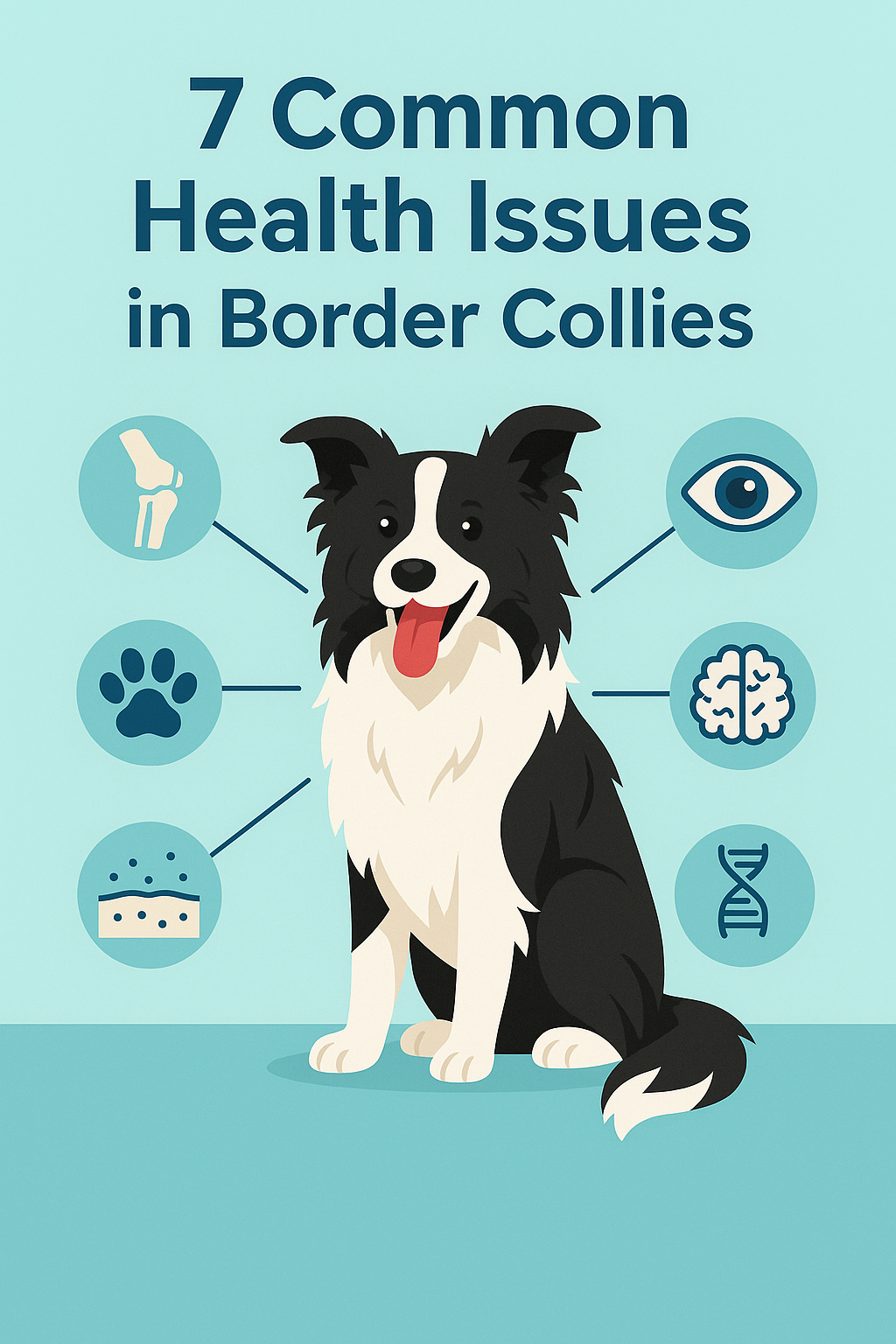
🐕 7 Common Health Issues in Border Collies – Prevention and Care Tips
7 Common Health Issues in Border Collies – Prevention and Care Tips
Smart, Athletic, and Sensitive – Border Collies Need Special Health Attention
The Border Collie is widely known for its intelligence, agility, and intense work ethic.
However, due to their high activity levels and genetic background, they are vulnerable to several health issues that require proactive management.
In this article, we’ll cover the 7 most common health issues in Border Collies, how to identify them early, and what you can do to prevent them.
⚠️ 7 Common Health Issues in Border Collies
1. Hip Dysplasia
An abnormally formed hip joint can cause pain, limping, and arthritis, especially in active dogs like Border Collies.
-
Symptoms: limping, difficulty climbing stairs, reduced mobility
-
Prevention: genetic testing before breeding, joint supplements
-
Treatment: weight management, hydrotherapy, or surgery
2. Progressive Retinal Atrophy (PRA)
This genetic disorder causes gradual vision loss, potentially leading to blindness.
-
Symptoms: poor night vision, bumping into furniture
-
Prevention: DNA screening, providing a safe environment
-
Management: no cure, but early detection helps with adaptation
3. Epilepsy
Border Collies are genetically predisposed to idiopathic epilepsy, often showing symptoms early in adulthood.
-
Symptoms: seizures, trembling, loss of awareness
-
Management: daily anticonvulsants, consistent routine, low-stress environment
4. Collie Eye Anomaly (CEA) & TNS
These breed-specific genetic conditions affect the eyes and immune system, and may significantly impact quality of life.
-
Symptoms: vision loss, weak immune response, stunted growth
-
Prevention: DNA testing before breeding
-
Management: no direct cure; supportive care is essential
5. Musculoskeletal Injuries from Overexertion
Due to their high drive, ligament injuries, sprains, and exercise-induced collapse are common.
-
Prevention: structured rest, balanced activity, avoid overtraining
-
Treatment: physical therapy, joint support, rest
6. Allergic Dermatitis
Border Collies are prone to skin allergies, often triggered by food, environment, or parasites.
-
Symptoms: constant scratching, red patches, hair loss
-
Prevention: allergen-free diet, regular bathing with medicated shampoo
-
Care: antihistamines, anti-inflammatory sprays, supplements
7. Hypothyroidism
An underactive thyroid can lead to weight gain, fatigue, and poor coat condition.
-
Diagnosis: blood panel
-
Treatment: lifelong thyroid hormone medication
🛡️ Health Care Tips for Border Collies
-
Maintain both mental and physical stimulation daily
-
Conduct genetic testing for inherited diseases
-
Prioritize low-impact endurance activities over high-impact bursts
-
Schedule regular checkups for eyes, joints, thyroid, and skin
-
Use orthopedic mats, joint supplements, and antioxidant-rich foods
🛒 Recommended Health Products for Border Collies
-
Joint supplements (glucosamine, MSM)
-
Eye support (lutein, omega-3)
-
Anti-allergy shampoo and skin sprays
-
High-protein, low-allergen dog food
👉 Shop Border Collie Health Essentials
External Link (DoFollow)
Reference: AKC – Border Collie Health & Wellness
Internal Link
👉 Related article: Common Health Issues in Chihuahuas – Prevention Guide
🧩 Frequently Asked Questions (FAQ)
Q1. Why do Border Collies have so many genetic conditions?
A1. Selective breeding without genetic testing has made conditions like PRA, CEA, and TNS more prevalent in the breed.
Q2. Can joint diseases be prevented?
A2. Yes, with proper breeding, early screening, and maintaining a healthy weight, hip dysplasia and ligament issues can be minimized.
Q3. How much exercise is too much for a Border Collie?
A3. If your dog continues to show restlessness or over-excitement even after an hour of high activity, it’s time to rebalance with more mental games and structured rest.


